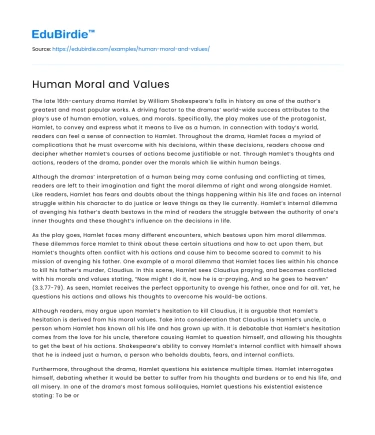The late 16th-century drama Hamlet by William Shakespeare’s falls in history as one of the author’s greatest and most popular works. A driving factor to the dramas’ world-wide success attributes to the play’s use of human emotion, values, and morals. Specifically, the play makes use of the protagonist, Hamlet, to convey and express what it means to live as a human. In connection with today’s world, readers can feel a sense of connection to Hamlet. Throughout the drama, Hamlet faces a myriad of complications that he must overcome with his decisions, within these decisions, readers choose and decipher whether Hamlet’s courses of actions become justifiable or not. Through Hamlet’s thoughts and actions, readers of the drama, ponder over the morals which lie within human beings.
Although the dramas’ interpretation of a human being may come confusing and conflicting at times, readers are left to their imagination and fight the moral dilemma of right and wrong alongside Hamlet. Like readers, Hamlet has fears and doubts about the things happening within his life and faces an internal struggle within his character to do justice or leave things as they lie currently. Hamlet’s internal dilemma of avenging his father’s death bestows in the mind of readers the struggle between the authority of one’s inner thoughts and these thought’s influence on the decisions in life.
Save your time!
We can take care of your essay
- Proper editing and formatting
- Free revision, title page, and bibliography
- Flexible prices and money-back guarantee
As the play goes, Hamlet faces many different encounters, which bestows upon him moral dilemmas. These dilemmas force Hamlet to think about these certain situations and how to act upon them, but Hamlet’s thoughts often conflict with his actions and cause him to become scared to commit to his mission of avenging his father. One example of a moral dilemma that Hamlet faces lies within his chance to kill his father’s murder, Claudius. In this scene, Hamlet sees Claudius praying, and becomes conflicted with his morals and values stating, “Now might I do it, now he is a-praying, And so he goes to heaven” (3.3.77-79). As seen, Hamlet receives the perfect opportunity to avenge his father, once and for all. Yet, he questions his actions and allows his thoughts to overcome his would-be actions.
Although readers, may argue upon Hamlet’s hesitation to kill Claudius, it is arguable that Hamlet’s hesitation is derived from his moral values. Take into consideration that Claudius is Hamlet’s uncle, a person whom Hamlet has known all his life and has grown up with. It is debatable that Hamlet’s hesitation comes from the love for his uncle, therefore causing Hamlet to question himself, and allowing his thoughts to get the best of his actions. Shakespeare’s ability to convey Hamlet’s internal conflict with himself shows that he is indeed just a human, a person who beholds doubts, fears, and internal conflicts.
Furthermore, throughout the drama, Hamlet questions his existence multiple times. Hamlet interrogates himself, debating whether it would be better to suffer from his thoughts and burdens or to end his life, and all misery. In one of the drama’s most famous soliloquies, Hamlet questions his existential existence stating: To be or not to be—that is the question: Whether ’tis nobler in the mind to suffer The slings and arrows of outrageous fortune, Or to take arms against a sea of troubles And, by opposing, end them. To die, to sleep— No more—and by a sleep to say we end The heartache and the thousand natural shocks (3.1.64-70).
As seen, due to the extenuating circumstances within his life, Hamlet asks himself if suicide is really the option. Within his recent life, Hamlet has faced and undergone many questionable and terrible circumstances, such as the death of his father, his mother remarrying his uncle, and his recent breakup. These Circumstances place a heavy doubt within Hamlet’s consciousness, causing him to question his existence as a human. Hamlet asks himself whether it is killing himself would become easier than living a life of burdens and doubts. In correlation to today’s world, many people, similar to Hamlet, questions the idea of their existence, often opting for suicide rather than living with their burdens. Hamlet embodies what it means to live as a human, a person who rightfully beholds fears and doubts.
The Elizabethan drama Hamlet by William Shakespeare goes down as one of the author’s most popular and relatable works. Within the drama, Shakespeare addresses the notion of what it means to be a human. This is done through the use of the protagonist, Hamlet. Throughout the novel Hamlet is faced with many different situations and experiences that question his moral values as a human as well as his existence as a human. Take for example Hamlet’s opportunity to kill Claudius. Although Hamlet was given the perfect opportunity, Hamlet, like all humans, knew that murdering his uncle was not the morally correct thing to do. This hesitation by Hamlet may be interpreted as Hamlet’s inability to choose between his thoughts and his wanted actions. Another aspect that makes Hamlet human lies within his doubts about life. Like most humans, Hamlet has contemplated his life, thinking that death would become easier than living a life of burden. Hamlet’s morals, as well as his questionability about life, make him a human, this factor, helps readers relate to the novel more, gaining a deeper connection and relationship with the fictional character.






 Stuck on your essay?
Stuck on your essay?

